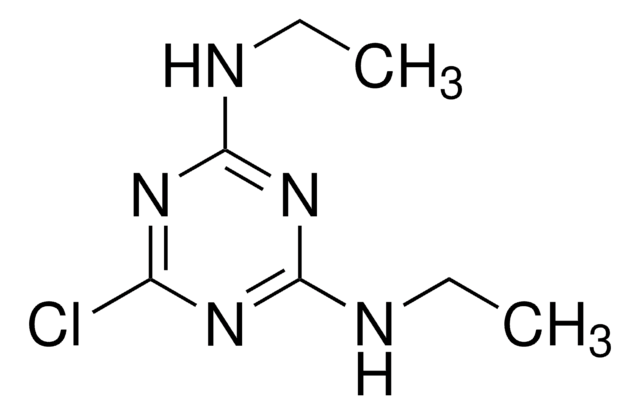40662
Simazine
certified reference material, TraceCERT®, Manufactured by: Sigma-Aldrich Production GmbH, Switzerland
Synonyme(s) :
2,4-Bis(ethylamino)-6-chloro-1,3,5-triazine
About This Item
Produits recommandés
Qualité
certified reference material
TraceCERT®
Niveau de qualité
Gamme de produits
TraceCERT®
Durée de conservation
limited shelf life, expiry date on the label
Fabricant/nom de marque
Manufactured by: Sigma-Aldrich Production GmbH, Switzerland
Température de stockage
2-8°C
Chaîne SMILES
CCNc1nc(Cl)nc(NCC)n1
InChI
1S/C7H12ClN5/c1-3-9-6-11-5(8)12-7(13-6)10-4-2/h3-4H2,1-2H3,(H2,9,10,11,12,13)
Clé InChI
ODCWYMIRDDJXKW-UHFFFAOYSA-N
Vous recherchez des produits similaires ? Visite Guide de comparaison des produits
Catégories apparentées
Description générale
Certified content by quantitative NMR incl. uncertainty and expiry date are given on the certificate.
Download your certificate at: http://www.sigma aldrich.com
Simazine is 1,3,5-triazine herbicide, absorbed mainly through roots. Systemic and selective in nature, it binds to the QB site on the D1 protein of the photosystem II complex, disrupting photosynthetic electron transport. Simazine is used for pre-emergence control of annual grass and broad-leaved weeds in pome fruit, stone fruit, bush and cane fruit, citrus, vines, strawberries, nuts, olives, pineapples, field beans, French beans, peas, maize, sweet corn, asparagus, hops, alfalfa, lupins, oilseed rape, artichokes, sugar cane, cocoa, coffee, rubber, oil palms, tea, turf, and ornamentals.
According to the Commission Implementing Regulation (EU) No 2004/247/EC of 10th March 2004, simazine is not approved for use in the European Union (EU) as a plant protection agent, following Regulation (EC) No. 1107/2009. But maximum residue levels of 0.01 mg/kg to 0.25 mg/kg are allowed for the presence of simazine in products of plant and animal origin, according to the EU Reg. No 310/2011.
Application
Simazine CRM may also be used as given below:
- Development and validation of an ultrasonic-assisted dispersive liquid-liquid microextraction (UA-DLLME) method for sample extraction, followed by gas chromatography-mass spectrometry based determination of endocrine-disrupting herbicides in the river and seawater samples
- Determination of triazine pesticide residues in samples of apples, pears, carrots, potatoes, tomatoes, avocado, cucumber, spinach, bananas, and oranges by modified QuEChERS and solid-phase extraction (SPE) procedures, followed by liquid chromatography-photodiode array (LC-DAD) analysis
- Multi-residue analysis of 67 pesticides in olive oil, olives, and avocado samples by liquid chromatography-tandem mass spectrometry (LC-MS/MS) to evaluate various clean-up sorbents
- Quantitation of 20 pesticides in eel and shrimp samples by a scheduled multiple reaction monitoring (sMRM) method and QuEChERS with EDTA for sample extraction and purification
- Analysis of 35 micropollutants including pesticides in water samples by liquid chromatography-tandem mass spectrometry (LC-MS/MS) after their solid-phase extraction
- Simultaneous quantification of 58 pharmaceuticals and personal care products (PPCPs) and pesticides in water samples by solvent-based de-emulsification dispersive liquid-liquid microextraction (SD-DLLME) combined with liquid chromatography-tandem mass spectrometry (LCMS/MS)
Produits recommandés
Informations légales
Mention d'avertissement
Warning
Mentions de danger
Conseils de prudence
Classification des risques
Aquatic Acute 1 - Aquatic Chronic 1 - Carc. 2
Code de la classe de stockage
11 - Combustible Solids
Classe de danger pour l'eau (WGK)
WGK 3
Point d'éclair (°F)
212.0 °F - closed cup
Point d'éclair (°C)
100 °C - closed cup
Choose from one of the most recent versions:
Certificats d'analyse (COA)
Don't see the Right Version?
If you require a particular version, you can look up a specific certificate by the Lot or Batch number.
Déjà en possession de ce produit ?
Retrouvez la documentation relative aux produits que vous avez récemment achetés dans la Bibliothèque de documents.
Notre équipe de scientifiques dispose d'une expérience dans tous les secteurs de la recherche, notamment en sciences de la vie, science des matériaux, synthèse chimique, chromatographie, analyse et dans de nombreux autres domaines..
Contacter notre Service technique







